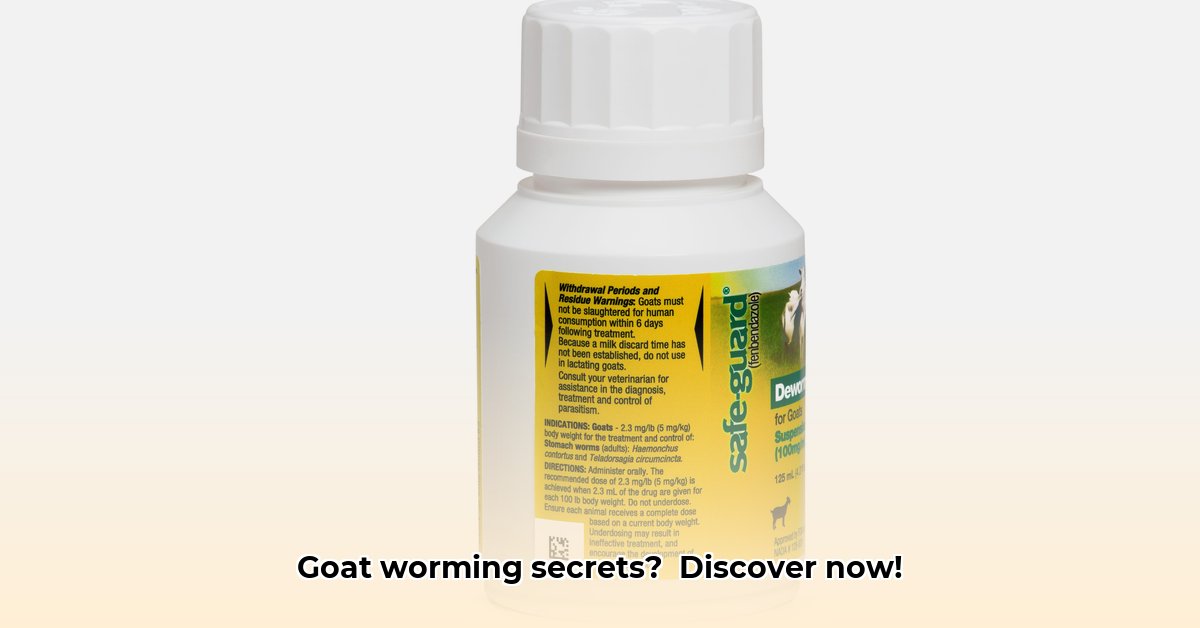
Keeping your goats healthy requires a proactive approach to parasite control. This guide focuses on SafeGuard goat dewormer from Tractor Supply, offering practical advice on its effective and responsible use. We'll explore common goat parasites, SafeGuard's mechanism, and crucial dosage information. But sustainable goat farming goes beyond a single product; we'll also examine environmental impacts and explore alternative strategies for long-term herd health. This holistic approach ensures healthy goats and a thriving farm. For more information on SafeGuard, see this helpful resource.
Understanding Goat Parasites and SafeGuard (Fenbendazole)
Goats are susceptible to various internal parasites, including Haemonchus contortus (barberpole worm) and Teladorsagia circumcincta (brown stomach worm), causing significant health issues. SafeGuard, containing fenbendazole, is a broad-spectrum dewormer that disrupts parasite nutrient absorption, effectively controlling many common infestations. However, remember that SafeGuard is a tool; responsible use is crucial. Always follow the dosage instructions precisely as printed on the Tractor Supply packaging. Accurate goat weighing before administration is non-negotiable. Incorrect dosages can be ineffective or even harmful to your animals.
Responsible Use of Safe-Guard: Preventing Resistance
Overuse of SafeGuard, like any medication, can lead to parasite resistance. This means parasites evolve to survive treatment, rendering the dewormer less effective. To minimize this risk:
Precise Dosing: Accurate goat weights are crucial for effective treatment. Even slight dosage variations can impact efficacy.
Detailed Record Keeping: Maintain a thorough record of each treatment, including date, goat identification, dosage administered, and post-treatment observations. This allows for meticulous tracking of your herd's health and treatment response.
Strategic, Not Routine, Deworming: Avoid routine deworming of the entire flock. Use fecal egg counts (FECs) – tests determining the number of parasite eggs in your goat's manure – to identify and treat only infected goats. Your veterinarian can advise on conducting or outsourcing FEC testing. This targeted approach significantly reduces resistance.
Consider Dewormer Rotation (Consult Your Veterinarian): Rotating dewormers might be beneficial, but this decision should be made in consultation with your veterinarian. Their expertise ensures a tailored strategy for your herd.
Environmental Considerations: Responsible Disposal
SafeGuard, like many medications, can impact the environment. Improper disposal of containers can contaminate soil and water sources. Always follow label instructions for proper disposal. This responsible practice protects your environment and ensures sustainable farming. Do you know the local regulations pertaining to agricultural waste disposal?
Sustainable Alternatives: A Holistic Approach to Goat Health
Sustainable goat farming employs preventative measures to reduce reliance on chemical dewormers. While SafeGuard is a valuable tool, integrating these strategies enhances long-term herd health:
Rotational Grazing: Regularly moving goats to fresh pastures disrupts parasite life cycles and reduces parasite build-up in specific areas.
Improved Pasture Management: Optimize pasture drainage to prevent parasite-friendly damp conditions. Manage vegetation diversity as certain plants support different parasite populations.
Herbal Remedies (Use with Caution): Some farmers utilize herbal remedies. However, scientific evidence supporting their efficacy varies. Always consult your veterinarian before using any herbal remedies. They can assess the safety and effectiveness for your specific situation. Are there any proven herbal remedies supported by research that you can confidently recommend?
Long-Term Strategy: A Sustainable Deworming Program
Sustainable deworming necessitates a long-term commitment to these core principles:
Regular Fecal Egg Counts (FECs): Frequent FEC testing provides invaluable data on parasite burdens and treatment efficacy.
Meticulous Record Keeping: Detailed records track trends, enable early problem identification, and assess various management strategies.
Strategic Deworming: Use dewormers only when needed, guided by FEC results, effectively minimizing resistance development and environmental impact.
Sustainable Pasture Management: Healthy pastures naturally reduce parasite loads, minimizing the need for chemical interventions.
By integrating these strategies, you build resilience within your herd, reduce chemical dewormer dependency, and promote environmentally responsible farming practices. This holistic approach creates healthy goats, sustainable farming, and long-term profitability.